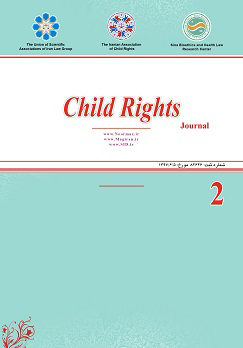Explaining Consent and Assent in the Treatment of Children from the Perspective of Jurisprudence, Law and Medical Ethics
Subject Areas : child rightsKourosh Delpasand 1 , Zahra Firouzabadi 2 , Ahmad Mashkoori 3 , Afsaneh Ghanbari 4 , Mohammad Nourian 5
1 - Assistant Professor of Medical Ethics, Department of Medical Ethics, School of Medicine, Kurdistan University of Medical Sciences, Sanandaj, Iran
2 - Researcher of Medical Ethics and Law Research Center Shaheed Beheshti University of Medical Sciences, Tehran, Iran
3 - Assistant Professor of Medical Ethics, School of Health and Religion, Qom University of Medical Sciences, Qom, Iran
4 - Researcher of Medical Ethics and Law Research Center Shaheed Beheshti University of Medical Sciences, Tehran, Iran
5 - Researcher of Medical Ethics and Law Research Center Shaheed Beheshti University of Medical Sciences, Tehran, Iran
Keywords: Consent, Assent, Treatment, Children, Jurisprudence, Civil Law, Medical Ethics, Child Rights,
Abstract :
Background and aim: Health professionals have the ethical and legal duty to achieve the highest level of protection for the safety and health of children in medical interventions. Children have different mental and physical capacities depending on age, type of illness and disability. But the important point is to examine the age of the child from the perspective of jurisprudence, law and ethics. Therefore, the present article examines how the framework of Iranian law on obtaining consent from children in a variety of non-surgical and surgical interventions and determining the legal criteria for consent of the child and his or her legal guardians. Method: This research is based on descriptive-analytical method and based on valid library documents and resources. Results: When the parent of the child cares for his or her interests, he or she is the best decision-maker in the therapeutic process. When parents are concerned about the child's best interests, they are the best decision maker in the therapeutic process. However, in cases where the forced parent has a high risk behavior for the child and does not allow the child to take the necessary medical treatment, health professionals must apply for a permit through the Prosecutor's Office to obtain treatment. Conclusion: Consent and agreement in children is a continuous process and in therapeutic situations depends on the child's ability and understanding of the situation. In many therapies, involving children in decision-making helps them to participate in the treatment process. It is recommended to set consent rules for the treatment of children in a variety of non-invasive and non-surgical interventions and invasive and surgical interventions.
1. Shojaei AA. Ethical Challenges in Pediatrics. Qom: Andisheh Mandegar; 2019.
2. Ethical Guide to Research on Vulnerable Groups. 2019.
3. Safai SH. Civil rights of persons and interdicted. Tehran: Research Center for Humanities Research and Development of Humanities Textbooks; 2013.
4. Unicef. Convention on the Rights of the Child. 1989.
5. Katoozian N. Civil law in the present order. Tehran: Mizan; 2016.
6. Semsarzadeh AR. Supervision Affairs of Incests. Tehran: Judiciary Publications; 2019.
7. Muhammad bin Mecca ST. Lame Dameshghiye. Qom: Dar al-Fekr; No Date.
8. Qebleie Khoi K. Ayat al-Ahkam. Tehran: Samt; 2012.
9. Civil law, Assistant to formulate, amend and disseminate presidential laws and regulations. 4th ed. Tehran: Assistant to Formulate, Amend and Disseminate Presidential Laws and Regulations; 2015.
10. Rezaei F. A review of child protection institutions in Iranian law. Sisters' Seminary Research Database Across the Country. Article ID: 16448. Available at: http://www.pooyeshwhcir/paper/view/16448. Accessed March 11, 2020.
11. Child and Youth Protection Act. Tehran: Parliament Research Center; 2004. Available at: https://www.rc.majlis.ir/fa/law/show/ 93849. Accessed March 15, 2020.
12. Mehrpour H. Womens Rghits. Tehran: Etelaat Publication; 2017.
13. Wolpe P. Neuroethics. Encyclopedia of bioethics. New York: Macmillan Reference; 2004. Vol.4 p.1894-1898.


